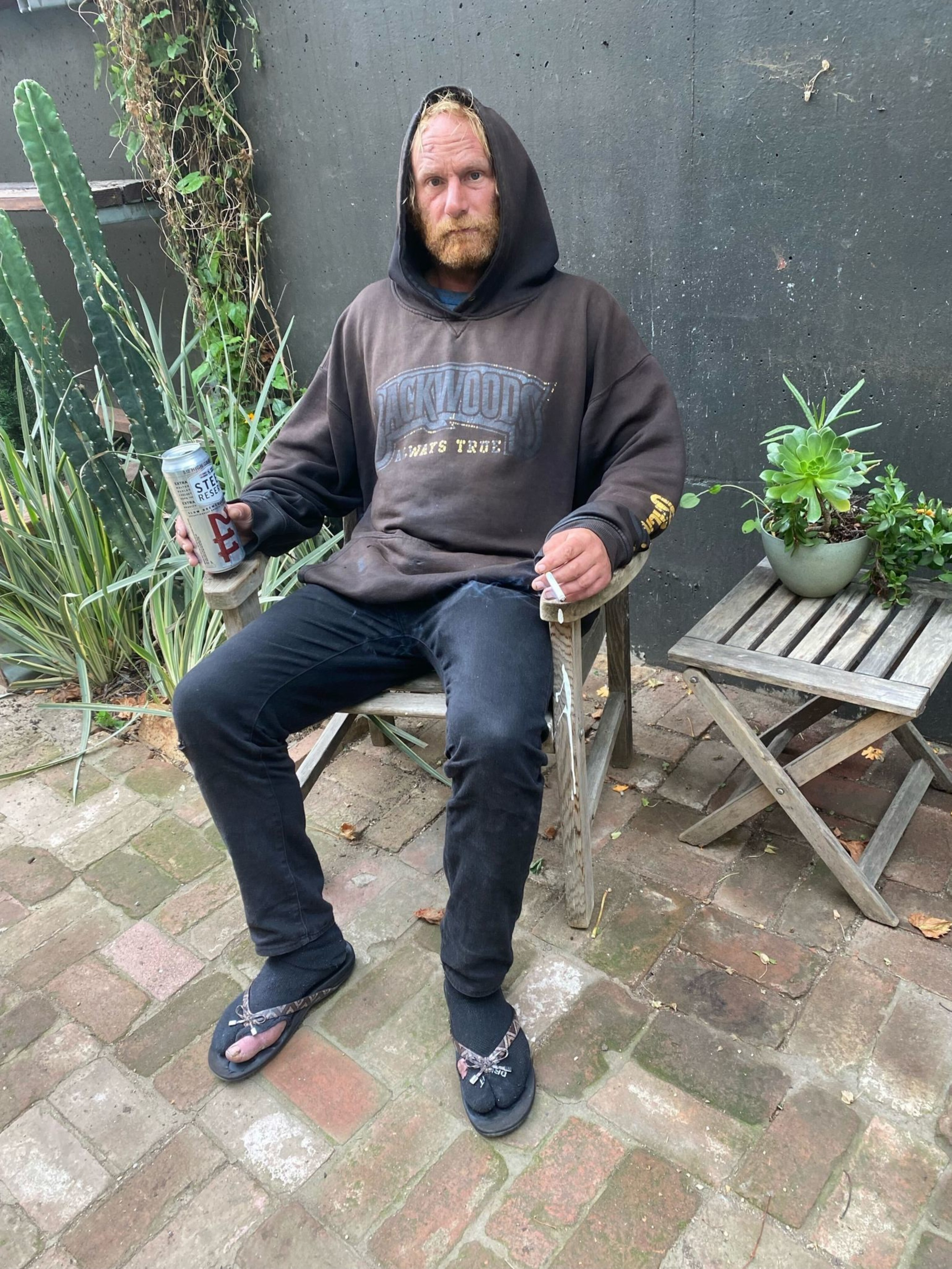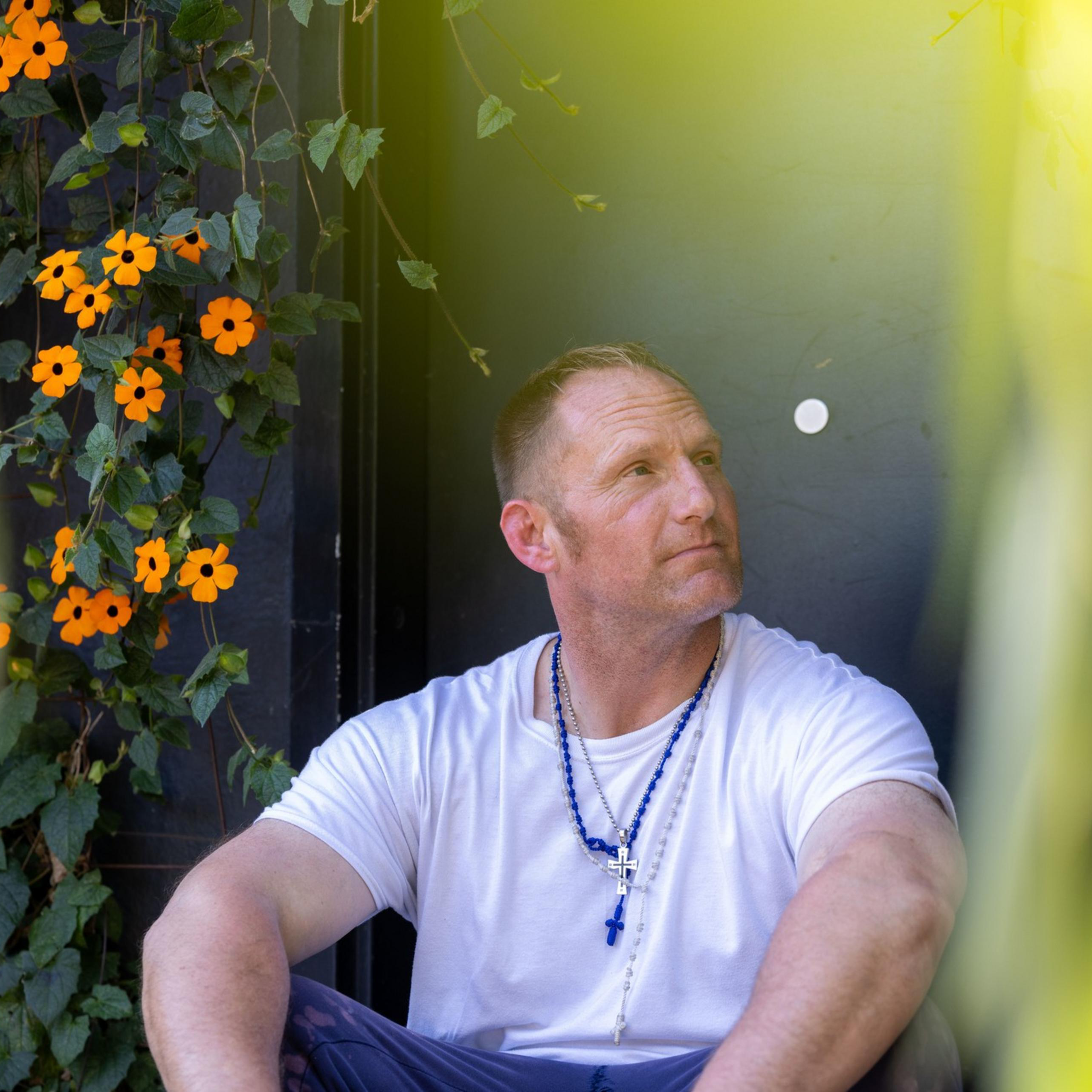Only a couple of years ago, Brad Burke was an unhoused, unemployed meth user who was sleeping in and around a community garden in Portola. A former fitness instructor, he had made several attempts to get sober, but none succeeded, even after he faced a few brushes with death.
Once a garbage-strewn strip alongside the 101 Freeway embankment, the garden where Burke sometimes bedded down was being transformed into a greenway by a coalition of neighbors led by Portola resident Angie Matt, an architect. It’s now filled with redwood saplings, a 16-foot Gothic-style gate and the half-buried chassis of a ’60s sedan.
“I met Angie one day because she was using her power tools,” Burke said. “I was trying to take a nap, and she said, ‘You might want to move, because we’re making a lot of noise.’ ”

He moved out of the way, but because it was a relatively secluded spot, continued to sleep there. He started hanging out more during the day, exchanging greetings with the neighbors and, over time, looking to help. Matt saw in Burke a cheerful guy who was eager to contribute. He was down on his luck and often inebriated but physically strong and unwilling to ask for anything.
When his blanket was stolen, Matt gave him another one. Through her, Burke met a small network of volunteer-minded people willing to help him turn his life around — not unlike the way they had turned the formerly derelict Caltrans property into a park.
With the help of the Portola community’s volunteers and clinicians at San Francisco’s integrated medical and social services clinic HealthRIGHT 360 (opens in new tab), Burke saw his prospects began to change. Today, at 39, he is sober and fit, with brand-new teeth. He’s living on Treasure Island and working as a security guard. He fills text replies with upbeat emojis and responds to a simple “How are you today?” with an irrepressible “I’m doing great!”

In a city where the homelessness crisis seems never-ending, Brad Burke is the rarest of success stories: a man teetering at the point of no return, helped to his feet through the sustained intervention of a constellation of do-gooders and professionals who took the time to care.
‘If I keep doing this, it’s going to kill me’
Like many people who have overcome struggles with substance abuse, Burke had a path that was not linear. The native of upstate New York hitchhiked to San Francisco when he was 21, working as a trainer and lifeguard before finding a job at Max Muscle Nutrition, a store in the Castro. For a period, he lived on Ocean Avenue, in a tumultuous relationship with a long-term girlfriend. “That’s why I picked up all these bad habits, ended up homeless and doing drugs and got around all these bad people,” he said.

Over time, he turned to meth. At one point, he was shooting it. He quit and relapsed several times, gradually becoming estranged from his family, who had adopted him in infancy, along with his biological brother.
At some point, he managed to quit meth for good, only to turn to drinking — specifically, Steel Reserve 211, a malt liquor with a high alcohol content. “I was drinking 211 at 6 and 7 in the morning,” he said. “And I was like, ‘If I keep doing this, it’s going to kill me.’” For a while, he was hanging out with a group of meth users near the Lowe’s store on Bayshore Boulevard but soured on their company. He ended up sleeping rough in Portola.
In the early days of his acquaintance with Matt, Burke was often drunk. According to her, their conversations were not very deep. Even so, volunteers in the greenway took an immediate liking to him. Dee Derisse, who owns Hey Neighbor, a cafe on Burrows Street next to the garden (opens in new tab), would see Burke as they started work for the day. The cafe staff were fine with him sleeping in the garden, as long as he moved before the start of business and cleaned up after himself.
“Little by little, we just started to get to know each other,” said Derisse, who has also experienced homelessness. “I would offer him coffee, water, snacks — you know, like, I get it. I get what it feels like for people to not acknowledge you.”

By Burke’s admission, he was consuming roughly 100 drinks a week at that time. After a friend remarked on his bloated stomach, Burke agreed to let Matt drive him to the doctor, where he tested positive for hepatitis C. The disease is treatable if patients adhere to a strict regimen, taking their medication regularly with meals. Burke didn’t think he could manage it if he were drinking, so he committed to full sobriety and entered Walden House (opens in new tab), an inpatient rehab center in the Haight.
That was Dec. 2. Burke has stayed sober since.
“Once I stopped and wanted to stop, everything started changing — slowly and then fast,” he said.
‘He’s my inspiration now’
Gary McCoy, vice president of policy and public affairs for HealthRIGHT 360, which operates Walden House, would not comment on the particulars of Burke’s case. But he said that moving from a 90-day detox stay at Walden House into one of HealthRIGHT’s “step-down” residential facilities is a common pathway for chronically homeless residents overcoming substance abuse.
Finding stable, long-term housing, however, can be the hardest part. Residential step-down facilities are funded by the city’s Department of Public Health, while landing permanent supportive housing relies on a specific definition of homelessness, set by the federal government. Perversely, it’s possible for someone who has been living on the streets for years to enter an inpatient treatment program and, therefore, no longer be considered unhoused.
Burke was among the lucky ones. Since January, he has been living in a HealthRIGHT 360 step-down facility on Treasure Island, going to group therapy twice a week. He has a sponsor. He reconnected with his mother in New York and wears necklaces she has given him. He even stopped smoking cigarettes, something that rubbed off on Matt.
“I quit smoking after 30 years, because he’s my inspiration now,” she said.

Other community garden volunteers stepped up to help, too. Matt’s friend Opal Essence works with seniors looking to reenter the workforce, often in a new occupation. After getting to know Burke, she helped him find a job with the Department of Public Works based on his physical endurance from years of working out.
“I created his résumé saying that he had a lot of strength,” Essence said.
Later, he asked for Essence’s assistance in finding a higher-paying job. Burke now works security at Muni underground stations and hopes to become an armed guard, which will require testing and licenses. (It helps that he has a clean criminal record.) He’s saving money for the first time in almost a decade and hopes to find permanent housing. Better still, for the first time in years, he will visit his mother and extended family back East for Christmas. To hear him boast about getting that time-off request approved is to hear a man who feels that things are finally, unequivocally, on the right track.

“I’m blessed,” he said last week, sitting at a table just outside Hey Neighbor, steps from where he used to sleep. “Every single day, I remember waking up over there. It sucked. I wore these clothes, and they were all dirty, and I couldn’t go to the bathroom.”
He’s gone back to the corner store on San Bruno Avenue where he used to buy tall boys of malt liquor. Now he buys cans of water instead — his preferred brand is Liquid Death — shocking the proprietor with his clean-cut appearance.
Recently, Burke had a chance encounter with the friend who’d once commented on the size of his belly. “He goes, ‘You’re fucking buff, Brad!’ I go, ‘Well, I put the 211 down. I traded the six-pack for a six-pack.’ ”

